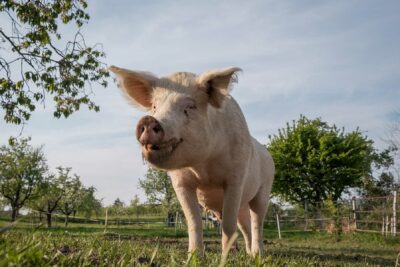There are so many good reasons to choose a vegan plant-based diet that it really doesn’t matter which one motivates us most! And the best part is that whether it is animals, the planet, biodiversity, food justice, personal health, public health or protecting forests that inspires us to eat plant-based, when we act for the good of one, we act for the good of all.
Should I Go Vegan for Animals?
Animals are the biggest victims of the farming industry, with billions being incarcerated, mutilated, exploited, and slaughtered every single year. And it’s not just farmed animals who suffer; when we eat meat, milk, and eggs, we are sacrificing wild animals, too. That’s because producing meat and dairy requires so much land that it is taken from nature. The animals whose home it was must flee or die.
Most of us love animals, but even if we don’t count ourselves as an animal lover, there are very few people who would deliberately harm another being. Yet, whenever we pay someone to produce meat, milk or eggs, we are paying for them to inflict violence on our behalf. It’s a strange inconsistency but it’s not surprising. We were brought up that way, and everywhere we look we are bombarded with messages that reinforce the idea that eating meat is normal. Increasingly, however, people are coming to recognize this conflict, and they are making changes that bring their actions in line with their principles. The selfless desire to protect animals from harm is probably the main reason why people become vegan.
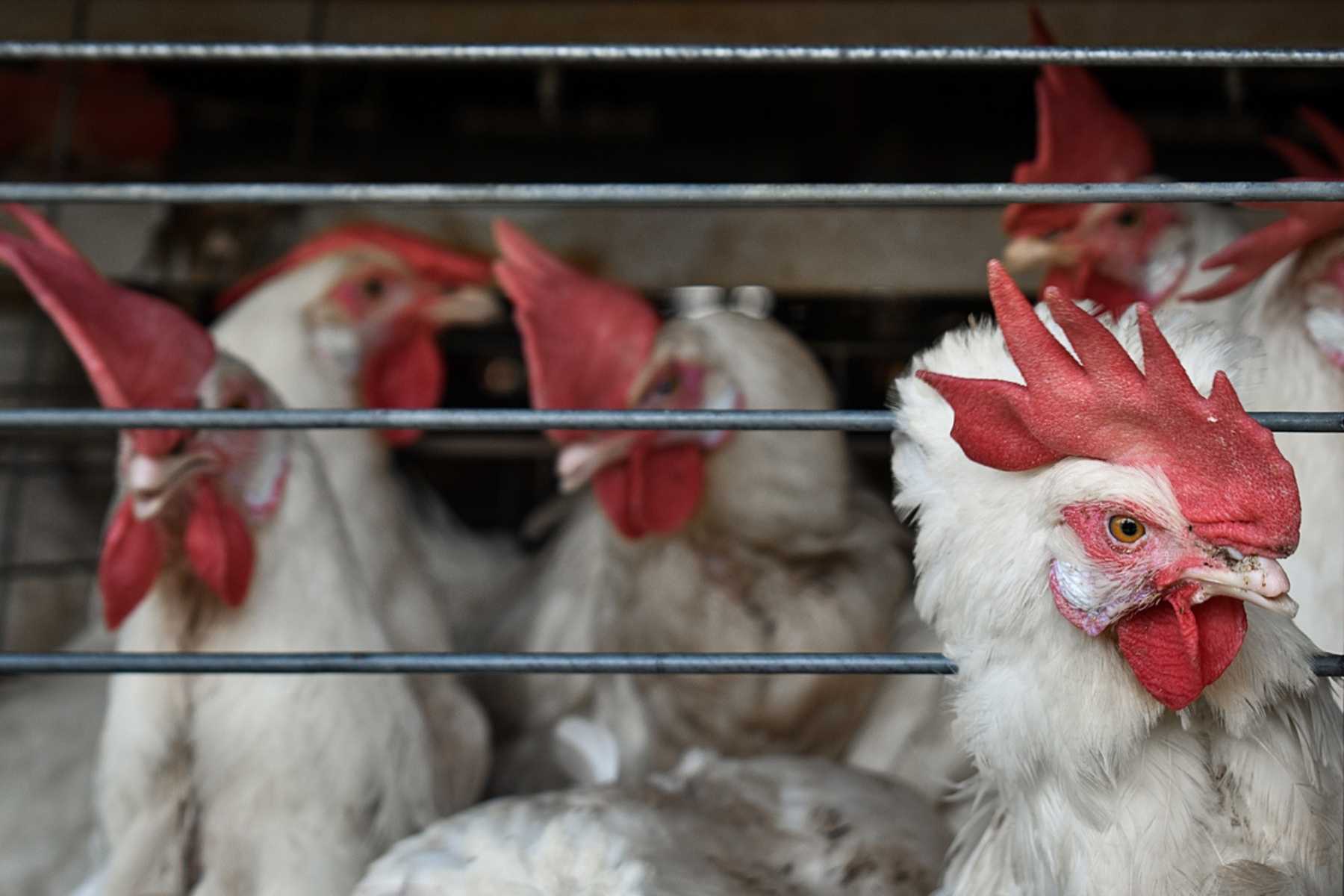
Battery Cages
Chickens naturally have a rich and active life. They love to bathe in dust, scratch in the earth, roam widely, build nests, roost in trees, and fly. It’s true that the birds we have selectively bred to have profitable, unnatural traits cannot fly far but they still want to try because it is their way of evading predators and it makes them feel safe. On egg farms, all of this is denied them. Most hens in the United States — and in many other countries, too — are caged for their whole adult lives. They never feel the sun on their feathers or the ground beneath their feet. They lose condition, their feathers fall out, their feet develop open wounds, and their bones become so brittle they are likely to break. The stress these birds endure is so extreme that they take their frustrations out on one another, sometimes causing severe injury. The physical and psychological harm done to hens — and all for a product we don’t need — is both heartbreaking and inhumane.
Cattle Confinement
Just as hens are confined and exploited, so are cows. Dairy farms often choose to keep animals confined in pens and bring feed to them instead of letting these natural grazers roam and chew the cud. Such confinement creates leg and foot problems from standing continuously on artificial surfaces, and digestive issues because they are not eating natural food.
Cows must be impregnated in order to produce milk, and their babies are taken away from them to stop them drinking the milk that their mothers made for them. Just at the time when they need their mothers most, many calves are removed and kept in isolated confinement until their bodies can be monetized by the veal or leather trades. Cows reared for beef are typically confined on feedlots too, crammed in pens alongside hundreds of others, nothing to do, their freedom to roam and graze denied them.
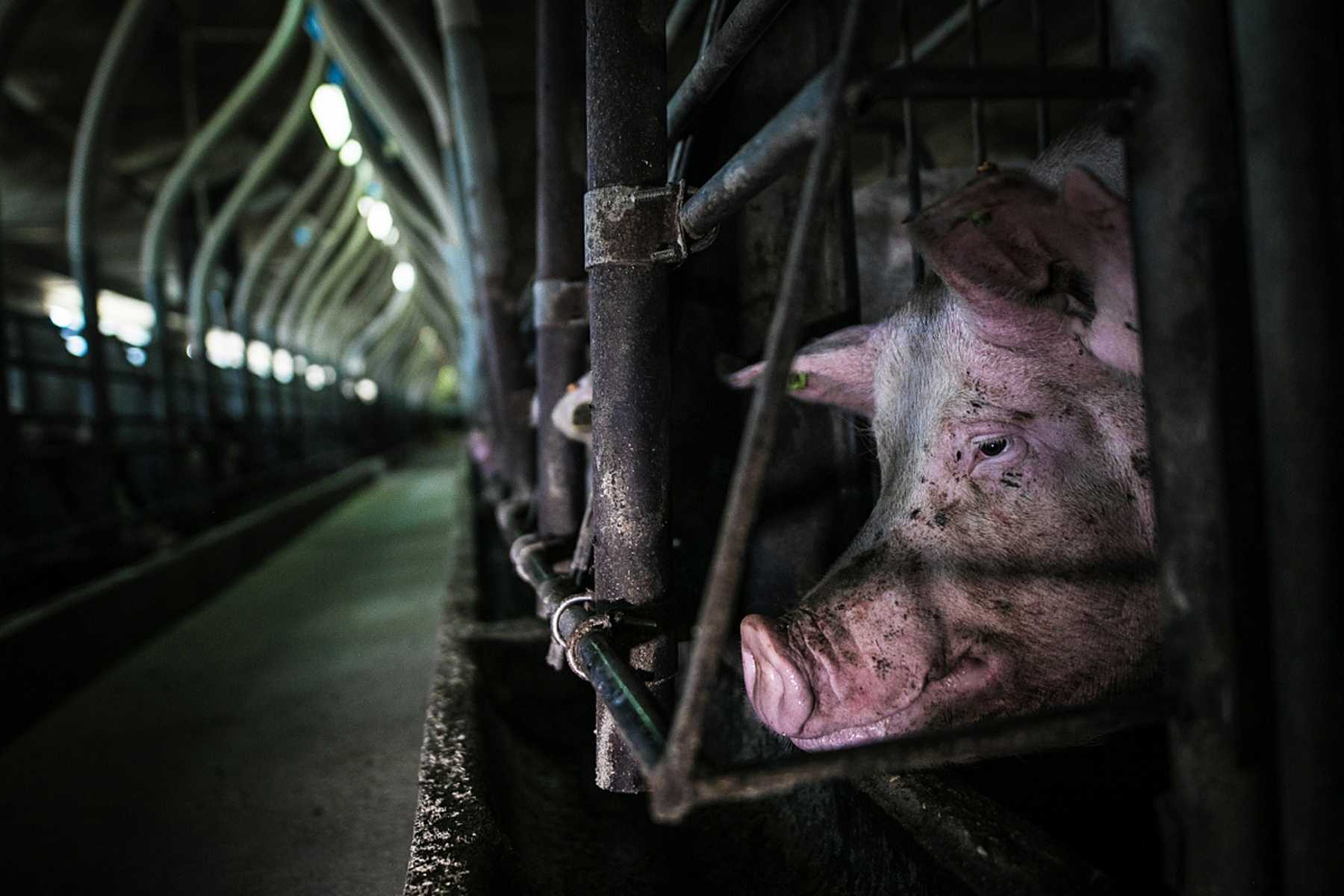
Gestation Crates
Can there be anything more appalling than locking a pregnant mother in a cage so small she cannot even take a step forward or back? This is the norm on America’s pig farms. There is no bedding and no nesting material, just a concrete or slatted floor and metal bars all around. The sows suffer painful gaping pressure sores from the hard floors and the psychological suffering is just as serious. Sometimes you can see these stressed mothers biting at the bars — a stereotypical behavior also seen in unhappy incarcerated zoo animals. Some sows will go through the motions of building a nest to keep her babies safe but there is, of course, nothing at all for her to make it with.
In other countries like the UK, gestation crates are banned but sows are still forced into farrowing crates, which are the same thing, but with a different name. Sows must give birth in them, and they will remain there until their piglets are 3-4 weeks old, when they will be taken away from their moms. In the wild, baby boar don’t stop drinking their mother’s milk until 3-4 months, but there is nothing natural about the meat industry.
Forced Molting
This is a practice so cruel it is banned in Europe. It is also misnamed and should, in reality, be called ‘enforced starvation’ because hens who are exploited for their eggs are deliberately starved for up to three weeks at a time. During that period, their hunger is severe and their bodies start to break down, with even their feathers falling out. Why would anyone deliberately withhold food from an animal for such an extended period? Because the industry found out that when it starts feeding the birds again after prolonged starvation, they lay larger, more profitable eggs. We don’t understand how anyone could inflict such deliberate suffering but this practice is both commonplace and legal. If you buy standard eggs in the United States, there is every chance they were laid by birds who are caged, starved, and have lived a life of great physical and psychological suffering.
Mutilations at Factory Farms
When we lock animals in crates, pens and sheds, and deny them the freedom and ability to express their natural behaviors, we create serious psychological suffering. It is common for animals in these highly stressful situations to take their frustrations out on one another. Instead of recognizing the anguish they inflict and remedying it, farmers instead compound the suffering by mutilating animals. Pigs have their teeth ground down and their tails cut off without anesthetic, in a bid to try and limit tail-biting. Chickens have the ends of the beaks seared off to prevent them causing injuries through pecking. Turkeys may be declawed to stop them lacerating one another. These, and other mutilations such as branding, dehorning, ear tagging, and tattooing, are all legal and commonplace but the fact they are done at all is proof of the failure of the pitiless system of farming animals.
Animals Are Slaughtered When They’re Babies
Animals bred for their meat are killed when they are just babies. Once animals have reached sufficient weight that their bodies can be monetized most profitably, there is no reason for a farmer to keep feeding them. That costs money and cuts into the profits! Animal agriculture is all about turnover — forcing animals to grow as fast as possible by selective breeding and artificial manipulation of their environment, lighting and feed — and slaughter them as soon as possible. Then repeat. This is a business where the bottom line is everything. Today, chickens are no more than six weeks old when they are slaughtered but their bodies are the size of adults. This rapid forced growth makes broken bones and heart failure all too common.
Lambs may be killed as young as four months, and pigs at just five to six months. The youngest animals slaughtered are the male chicks from the egg industry who are killed on their very first day of life. Male calves born in the dairy industry may also be killed at just one day old.
Cruel Transportation
The lives of animals may be unbearable on the farm but their deaths are not easy or humane either. To get to the slaughterhouse, animals are loaded into crates or straight onto trucks and they may endure days on the road or at sea in searing heat or biting cold. They are crowded in, unable to rest or sit down. There is no water or feed available to them and, of course, they are frightened. Many animals are transported pregnant and may give birth on the journey.
The laws that are in place to mitigate the worst suffering during transport are far too weak and even these are routinely disregarded. It is horribly common for animals to die en route having never known a moment of kindness or happiness.
Humane Animal Farming Doesn’t Exist
There is no humane way to farm animals. When we see other sentient beings as valuable only in terms of the money that can be wrung from their bodies, it becomes obvious that this industry is based on the exploitation and commodification by the stronger of the more vulnerable. We don’t believe this can ever be ethical.
Sure, some farms allow animals a little more space to roam, but beware of the marketing and humane-washing! “Free range” often just means a patch of dirt, which may not even be outside. “Grass-fed” does not necessarily mean that the cow was permitted to graze. She may have been incarcerated in a feedlot and the grass-based fodder brought to her.
But even if farms were rural idylls, where cows grazed in meadows, chickens scratched around a yard, and pigs got to root in a forest — which is a world away from modern farming — would it be humane then? Only if you think that cutting the throat of someone who doesn’t wish to die is humane.
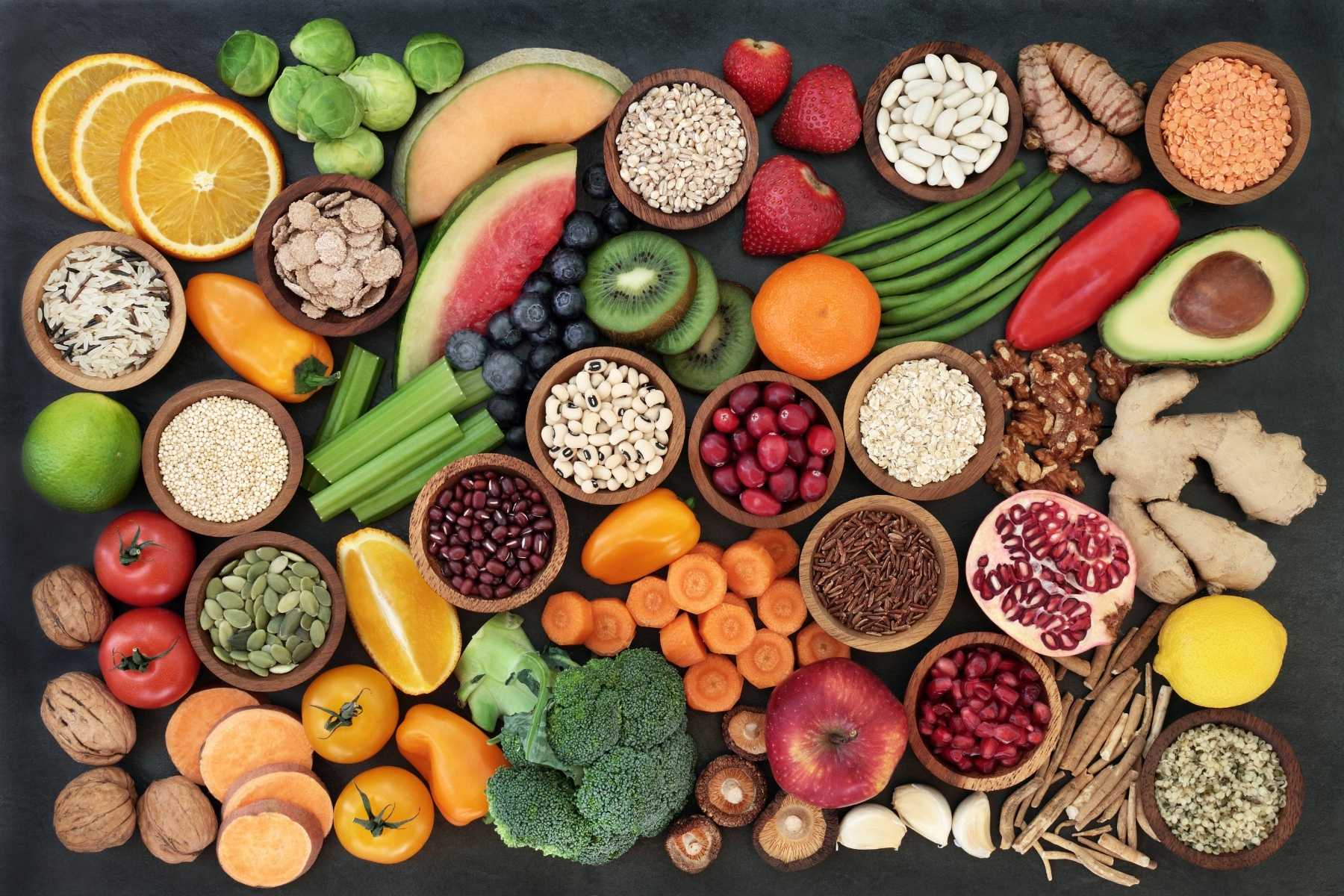
Why Go Vegan for Health?
The beautiful thing about doing the right thing is that everyone wins! When we make choices that are good for animals, it turns out, they are good for us too. Eating animals and their secretions and excretions is connected to a whole host of health problems, but when we eat plant-based foods, we give ourselves the best shot at reducing the risk of many chronic diseases. Of course, not every vegan food is healthy but when we choose a whole food plant-based diet — of grains, beans, legumes, herbs, salads, vegetables, fruits, nuts, and seeds, and all the delicious products made from them — amazing things can happen.
Increase Your Energy
It is common for new vegans to report that their energy levels go through the roof. We don’t know for sure why this would be but there are lots of theories. One is that it takes more energy to digest meat and animal products, which can leave us fatigued (remember how we can get sleepy after a big meal?). Digesting plants requires less energy, and that means more for us! But also, as a plant-based diet tends to be lower in fat, higher in fiber and contains no cholesterol at all, it can positively impact all our body’s processes. One new vegan, an amateur boxer, said she felt so much lighter and that it felt like her body was finally running on a clean fuel source. We know what she means!
Get in a Better Mood
Another change that many new vegans experience is that their mood lifts. For some people, this can be dramatic, and they say that symptoms of depression have eased or even disappeared. Of course, this won’t be the same for everyone. Becoming vegan can be life-changing for some but it’s not a cure-all. And yet, there is a peace of mind that comes when we live our values. It’s like the pieces all just fall into place.
Are vegans happier? We can’t say that for sure. But the “happiest man in the world”, a Tibetan monk named Mattieu Ricard, whose positive brain waves were off the chart, is vegan. Compassion and happiness can go hand in hand.
Healthy Hormones
When we reach for something to satisfy a craving, we may not be thinking about food in any way other than how it will taste. But food is the fuel our bodies and minds need to function optimally. If we feed it junk, it’s going to have an impact, including on our hormones. These natural chemicals have to work in synergy and they affect every part of our lives from skin to sleep to energy levels. So, how do we keep them happy and balanced and working optimally? Dr. Gemma Newman says increasing fiber and keeping the gut microbiome healthy are two important ways to do that. And you know what diet is great for fiber and a happy gut? A whole food plant-based diet! Dr Newman agrees. She is vegan, too.
Find out more from Dr. Gemma Newman, speaking on the Rich Roll podcast, about how a plant-based diet can help promote hormone health.
Improve Digestion and Gut Health
Evidence is increasingly showing that the gut microbiome plays a pivotal role in both our short and long-term well-being. Our guts are home to trillions of microbes and keeping these microscopic guests happy is essential for our health. And there is a lot we can do, including eating a wide variety of plant foods. Whole grains, antioxidant-rich fruits, and the prebiotic fiber in loads of different vegetables promote optimal gut health. By contrast, animal products are inflammatory, feed the bad bacteria, and can raise the risk of many serious diseases, including heart disease, type 2 diabetes, and some cancers. Plus all that lovely fiber in whole plant foods makes the entire digestive process a lot smoother and more comfortable.

Lower Your Risk for Heart Disease
It’s long been known that a plant-based diet is a heart-healthy diet, and there are two main reasons: the nutrients in plants boost cardiovascular health and vegans naturally load up on those. But also when we omit meat, dairy and eggs, we are significantly reducing the more problematic saturated fats which increase our blood cholesterol and raise the risk of heart attacks and strokes. Research shows that eating five servings of fruits and vegetables a day helps lower the risk of heart disease and stroke slightly, but ten servings a day can reduce the risk of cardiovascular disease by 28 per cent, and premature death by 31 per cent. So, eat as many plants as possible! There is no upper limit!
Reduced Risk for Cancer
All processed meat causes cancer — and that includes bacon, hot dogs, salami, pastrami, ham, and any other meat that has been salted, cured, fermented or otherwise processed. The World Health Organization further states that all red meat is “probably carcinogenic”, too. And what about white meats? When we cook any meat including white meat and the meat from fishes at high temperatures, such as when we grill, fry, or roast it, chemicals called heterocyclic amines form, and these are also linked to an increased cancer risk. Eating meat is certainly a risky business.
Eating plant-based foods, however, is cancer-protective. Research shows that if we eat a healthy vegan diet there is “a marked reduction in mortality and age-adjusted incidence of many cancers common in Western society. These cancers include breast, prostate, colon, pancreas, ovary, and uterine endometrium cancers.”
Reduced Risk of Alzheimer’s
Sadly, there is no cure for Alzheimer’s, the degenerative disease characterized by memory loss and the erosion of cognitive abilities. However, research indicates that lifestyle factors can play an important part in protecting brain health and preventing Alzheimer’s. To do this we need to look at exercise, social engagement, our stress levels, and quality of sleep. And, of course, diet plays a central role.
Experts in the field of Alzheimer’s prevention, Drs. Aysha and Dean Sherzai recommend a fully plant-based diet, and say there is no one food we should eat, but that the benefits come when we choose a wide variety of fruits, vegetables, nuts, legumes, seeds and grains. These pioneering doctors are vegan, too.
Reverse Type 2 Diabetes
Type 2 diabetes is so serious it can lead to heart disease, kidney failure, limb amputations, blindness, and premature death. Although rates of diabetes are rising all over the world, developing it is not inevitable, even if it is common within your family. Not only can we prevent it, but it is also possible to reverse it if we are already diagnosed with it. To do this, lifestyle changes — including changing our diet — are key.
We know that higher intakes of both red meat and poultry are associated with a significantly increased risk of developing type 2 diabetes. But eating a plant-based diet can make all the difference. We have known this since 2003 when a study, funded by the NIH, found that a plant-based diet controls blood sugar three times more effectively than the diet usually recommended for people with diabetes. Since then, the evidence for adopting a whole food plant-based diet to combat and reverse diabetes keeps mounting.
Reasons To Go Vegan for the Environment
This planet is all we have and it provides everything we need to live happily, sustainably, and healthily. Yet, we are recklessly overconsuming and it is having devastating impacts on the world around us, other species, and ultimately our own ability to survive. When we eat meat, eggs, and milk from animals, the environmental repercussions are huge.
Deforestation
Producing meat requires vast amounts of land and when we think about it, it is obvious why. Instead of growing crops to feed 8 billion human mouths, we are growing crops to feed 80 billion animals’ mouths. That means we need a lot more crops and a lot more land to grow them on. There simply isn’t enough farmland available and so more land is taken from nature. Forests are felled to make way for cows and to grow the soy that is shipped around the world and fed to farmed chickens, pigs, fish, and dairy cows. If we got more protein or calories back in the meat, milk and eggs than we fed to the animals, there would be an argument for this system. But we don’t. We get a lot less, which is why Chatham House calls meat production “staggeringly inefficient.” It’s wasting the Earth’s resources, and destroying its precious forests and ecosystems, and all for a product we don’t need.
Global Warming
Cutting down forests has a huge climate impact. Not only does the slash-and burn technique favored by cattle ranchers release vast amounts of climate-altering gasses, but the loss of trees means less carbon can be sequestered from the atmosphere. Another significant contributor to climate breakdown comes from the animals themselves. The methane emitted, particularly by ruminants such as cows, sheep and goats, is a powerful climate-altering gas, while all intensive farming — of chickens, pigs, turkeys, ducks, geese, and fish including shrimps — are also serious methane emitters. Scientists say the fastest way to tackle climate breakdown is to tackle methane and animal agriculture is routinely cited as a leading source.
In all, the farming of animals so that people can consume their meat, milk, and eggs is responsible for 14.5 percent of all greenhouse gas emissions. If we want a habitable planet, we need to stop.
Wild Animals Are Killed
When we destroy natural habitats to create farmland to cater to our meat habits, we destroy the homes of billions of animals. In many cases, they cannot just move on, as there is nowhere for them to go. This wanton destruction, coupled with the extreme weather events caused by climate breakdown, and humans hunting them for sport or food, form the reasons why wild animal populations are in freefall. In fact, sixty percent of all wild animal populations have died out just since 1970. It’s biological annihilation, and human activity is to blame. And spare a thought for the animals who live in the sea. The world’s commercial trawlers kill trillions of fishes every year. Among the deaths are sharks, whales, dolphins, porpoises, seals, turtles, rays and albatrosses who get caught in the vast nets that drag our oceanic friends from their homes. These “accidental” victims are known as “by-catch” but there is nothing accidental about it. Killing millions of non-target animals and destroying entire ecosystems is inevitable when we ransack the oceans for fish.
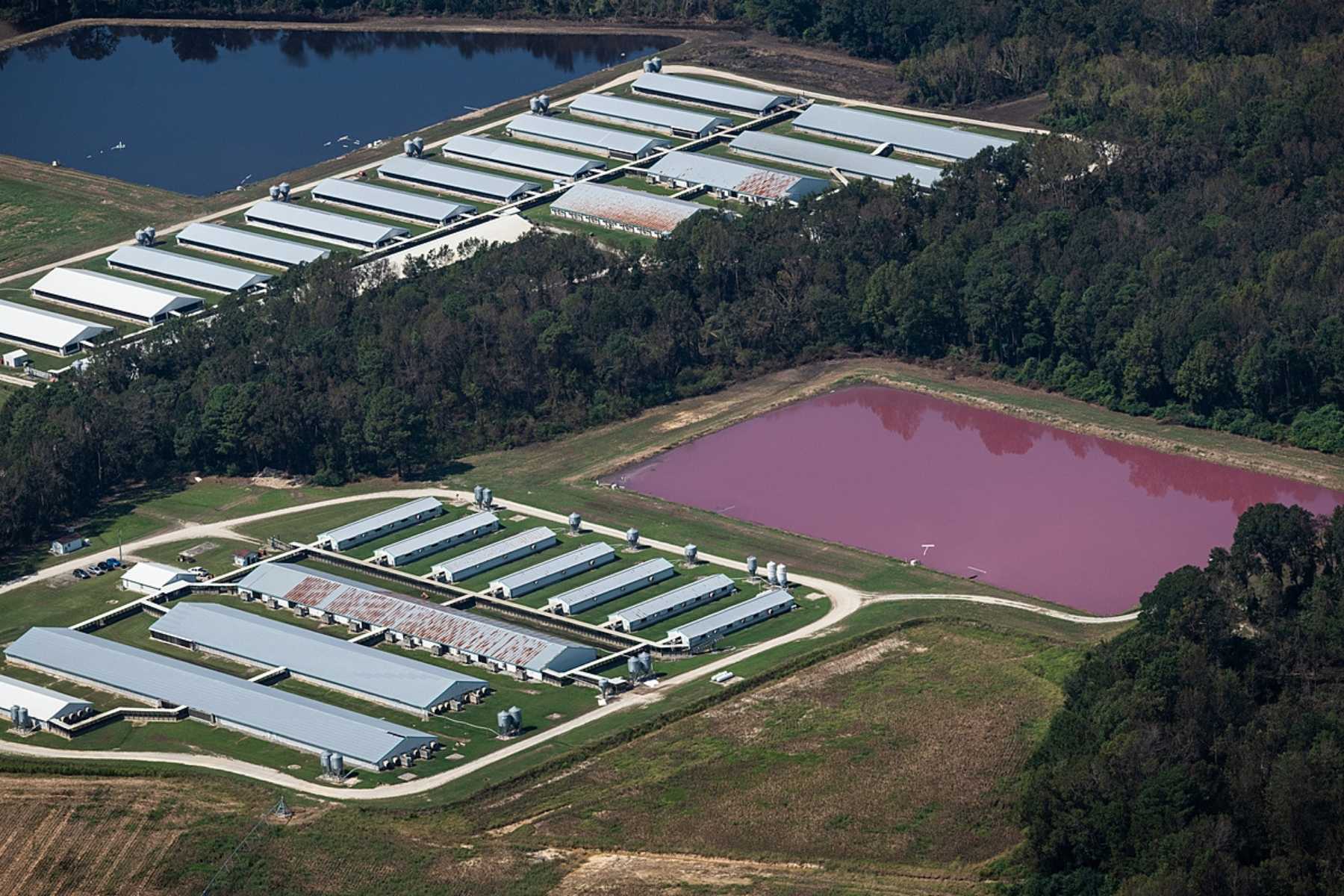
Water Pollution
We have seen that one major environmental problem with farming billions of animals is that they need so much to eat. Another is the flipside: the vast amounts of poop they produce. All of that waste has to go somewhere but there is now just too much of it to dispose of. It gets sprayed across the land when and where it shouldn’t, and it leaks out of storage “lagoons” and leaches into waterways. Once in the rivers and lakes it feeds algal growth which in turn destroys aquatic life by using up all the oxygen in the water. Once again, what is bad for the natural world is bad for us. Algal blooms can be toxic to people and their beloved dogs, and can even be fatal to both.
Oceans
Rivers inevitably run to the sea, taking their pollutants with them, and animal waste from farms is also discharged directly into the ocean where the same algal blooms occur. In large bodies of water, it causes ocean dead zones, where there is so little oxygen, no animal can survive. Those who had lived there must flee or die. When we farm animals to consume their meat, milk, or eggs, we are causing untold damage to the waterways, to aquatic life, and to the viability of the oceans. If you remember that the oceans are responsible for producing much of the oxygen we breathe, you’ll see why protecting them is vital for our own well-being as well as for the animals who live in them.
Air Pollution
Factory farms — which produce most of the meat eaten today — are full of dangerous airborne toxins.The hydrogen sulfide in manure can be deadly to people while ammonia, which builds up inside animal farms, is an irritant and a toxin. When these gasses combine with dust and dander, they form particulates that are associated with lung disease. Farm workers may be most at risk but they are not alone…

Rural Communities
Unsurprisingly, the negative impacts of these farms disproportionately affect rural communities. They are forced to breathe in the toxins, which impacts their quality of life but also their health. Research shows that those who live near intensive farms have worse respiratory health, and the more farms there are, the worse the outcome.
Rural communities must also cope with the poor smells, and the toxic waterways that can affect them and their animals. No one is a winner when there is an animal farm situated in the neighborhood.
Water Use
Just as we need to produce vast amounts of crops to feed animals, so we need to use vast amounts of water for them to drink and to grow the crops they eat. The slaughter process further uses huge amounts of water. For these reasons, the water footprint of meat, milk, and eggs is significantly bigger than for all plant foods except for nuts, which, although requiring a lot of water to grow large trees, more than earn their environmental credentials in terms of the amount of atmospheric carbon they sequester. There is no similar positive environmental impact for the production of prawns, cheese, lamb and mutton, milk, and meat from pigs, which are among the biggest users of water, while also requiring large amounts of land and emitting vast amounts of climate-altering gasses. As an example, 100g of protein from chicken meat uses 2.5 times as much water as tofu, while 100g of cheese requires 25 times as much.
With climate breakdown making water more scarce and droughts more severe, we must be more mindful of the water impact of the foods we eat.
Why Is It Not a Good Idea To Go Vegan?
Veganism is about avoiding as far as possible and practical all animal products. So, for everyone who cares about animals, the planet, their own health, or public health, going vegan is a great idea. It’s true that not everyone is able to become fully vegan, but that is where the phrase ‘as far as possible and practical’ comes in. If we believe in a kinder, safer, fairer world for all, and we are prepared to do all we can to achieve it through changing our diet, then we are vegan, even if we are not perfect. And just so we are clear: there is no perfect vegan. We’re all doing our best within a food system that is not designed for rationality, justice, equity, compassion and good health.
So, we believe it is a good idea for everyone to become vegan, even if that means ‘as vegan as possible’ within their own circumstances.
Is There a Downside to a Vegan Diet?
Not really. Of course, it can take some time to adjust our habits. When we have eaten animals for our whole lives, and that food is all around us, marketed to us, and hidden in so many of the products we buy, there is a lot to unpick when we decide to eat only plants.
Recipes will need adjusting; we’ll need to be open to trying some new products; and we’ll have to get used to breaking old habits. And of course, some of the foods we once loved won’t be available to us. It’s true that there are vegan alternatives for almost everything so if you love chicken nuggets or ice cream you’ll still be able to have those things, made deliciously vegan. But whether they are available in your area is another question and could be another hurdle to overcome.
But, millions of people from all backgrounds and in all countries have already made the change and it is possible for most people to do the same. Moving towards a vegan diet slowly and sustainably can be a good option for those starting out. Some people find it easiest to switch out one product at a time, such as dairy milk for plant milk, then burgers for meat-free patties. For others, being vegan three days a week is a good way to ease in. Or they might try a fully vegan week or month, guided by us. Everyone at Generation Vegan has already made the transition from meat-eater to vegan, so we know the challenges and pitfalls!
However, by far the most common statement we hear from vegans is: It really wasn’t as hard as I’d feared and I wish I’d done it sooner.
And in terms of the planet, animals, our own health and that of people all over the world, no, there is no downside to becoming vegan.
Check out our Tips for New Vegans.
Conclusion
The number of vegans grows every year as the damage caused to people, animals, and the environment by the animal farming industry becomes more widely known. How can we allow such an industry to keep polluting our planet, destroying habitats and wildlife, and unleashing viruses on the world? It is clear the industry will not stop, and nor will our political representatives reign it in. It is up to us, and we do have the power to halt this destructive industry in its tracks simply by withdrawing our financial support from it.
When we buy plant-based foods, we are saying: I will live my principles. I will not sacrifice a healthy planet for meat, milk, and eggs. I will not look the other way while the planet is destroyed. When faced with these health, ethical, and environmental crises, changing what we eat may seem like a small thing, but the repercussions are widespread and powerful. We can be the change.
Are you ready to give it a go?
